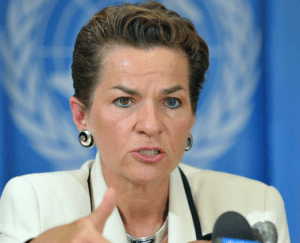A Paris Climate Agreement—Africa’s opportunity for a sustainable century

Traditional investment means first taking a risk to reap a reward later. The beauty of climate action is that the reward comes first and future risk is reduced.
This can be especially true in Africa where ministers meet in mid-April for a special high-level event of the 7th Africa Carbon Forum.
Renewable energy and smart grids, energy efficiency, cutting pollution and climate-proofing infrastructure, homes and industry have immediate benefits to government, business and citizens: cutting costs, improving health, protecting livelihoods and investments and generating new green jobs.
Indeed the solutions to climate change offer a portfolio of no-regret policies and actions that are essential to achieve sustainable development and avoid the worst climate change.
Africa would lose more than most from unchecked climate change but it will benefit more than most from strong climate agreements and effective action.
This is a key time for Africa, with its rising economic potential and young, growing populations vulnerable to climate change to seize all the rising opportunities emerging in 2015.
Access to electricity is crucial to development yet the International Energy Agency calculates that two-thirds of people in sub-Saharan Africa, more than 620 million of them, are without electricity.
Nearly 730 million people still rely on cooking with wood and charcoal, harming health and destroying vital forest cover.
Countries are already responding with ambitious plans, including one that was among many inspiring outcomes from the UN Secretary-General’s Climate Summit last September.
A total of 19 African countries have endorsed a plan for an Africa Clean Energy Corridor to speed deployment and trade of renewable power in a continuous network from Egypt to South Africa with support emerging from proposals including the Africa 2020 Access to Renewables Initiative.
Success means that half of electricity in East and Southern Africa could come from renewables by 2030, up from a fifth today.
Many countries in Africa recognize the threats but also the opportunities. When I spoke with African ministers in Cairo, in March, at their environment conference my confidence grew that Africa can leverage two critical events this year to do just that.
First, governments will reach a new, universal climate change agreement in Paris in December under the UN Framework Convention on Climate Change.
Climate science shows that Paris must deliver a three-part trajectory to keep average global temperatures from rising dangerously beyond 2 degrees Celsius: peak global emissions in the next decade; trigger a deep de-carbonization of all economies and reach climate neutrality in the second half of the century at the latest. Climate neutrality is when ecosystems or technology absorb all remaining human greenhouse gas emissions.
Second, ahead of Paris, governments will submit their contributions to the agreement in the form of national climate plans, known as Intended Nationally Determined Contributions (INDCs). These offer developing nations a fresh chance to set out their own priorities for climate action in the context of sustainable development and in support of the Sustainable Development Goals.
Clearly finance, both public and private and from within but crucially outside Africa will be key to realize the region’s ambitions and protect the most vulnerable.
Progress is being made. The Green Climate Fund hit its initial capitalization of over $10 billion. The Global Environment Facility, Adaptation Fund and the multilateral development banks all offer climate financing.
The African Development Bank recently released a strategy to promote high quality green growth in Africa taking into account risks and opportunity for action, including climate change.
It is also fitting that the ministers in Marrakesh meet to discuss and plan their INDCs at a forum dedicated to finance, carbon markets and mechanisms such as the Kyoto Protocol’s Clean Development Mechanism (CDM).
The CDMhas spurred the registration of nearly 7,900 projects and programs in over 100 countries, removing the equivalent of 1.5 billion tonnes of carbon dioxide from the atmosphere and mobilizing billions of dollars of investment. The CDM also leverages private sector investment up to 10 times the amount of public funds allocated.
Another powerful tool under the UN Climate Convention that developing countries can use is something called a NAMA (Nationally Appropriate Mitigation Action). These plans range from local actions to broad national policy initiatives and are based on a country’s specific needs and the UN Development Program found that over 60 per cent of countries it surveyed will prepare their national climate plans ahead of Paris by building on their NAMAs.
As African countries consider their national climate plans and help the world toward a successful conclusion in Paris, I encourage them to consider how to make best use of existing finance and mechanisms and to push forward with new and innovative policies.
The Africa Carbon Forum offers an opportunity for countries across the region to take forward their ambitions for Paris upon which a lasting, sustainable century can be built.
By Christiana Figueres,
Executive Secretary,
UN Framework Convention on Climate Change
